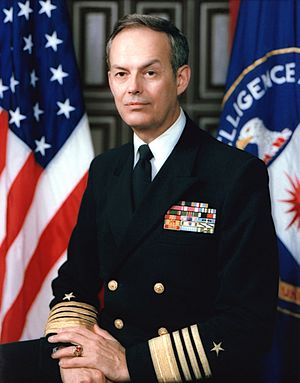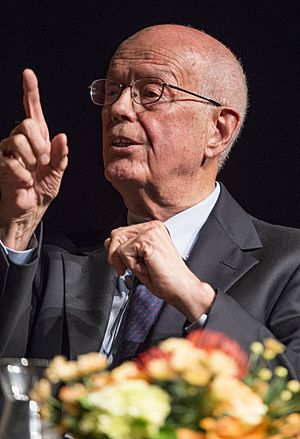Bobby Ray Inman facts for kids
Quick facts for kids
Bobby Ray Inman
|
|
|---|---|
 |
|
| Chair of the President's Intelligence Advisory Board | |
| Acting April 5, 1991 – January 20, 1993 |
|
| President | George H. W. Bush |
| Preceded by | John Tower |
| Succeeded by | William Crowe |
| 14th Deputy Director of Central Intelligence | |
| In office February 12, 1981 – June 10, 1982 |
|
| President | Ronald Reagan |
| Preceded by | Frank Carlucci |
| Succeeded by | John McMahon |
| Director of the National Security Agency | |
| In office July 1977 – February 12, 1981 |
|
| President | Jimmy Carter Ronald Reagan |
| Deputy | Benson Buffham Robert Drake Ann Caracristi |
| Preceded by | Lew Allen |
| Succeeded by | Lincoln Faurer |
| Personal details | |
| Born | April 4, 1931 Rhonesboro, Texas, U.S. |
| Political party | Republican |
| Education |
|
| Military service | |
| Allegiance | United States |
| Branch/service | United States Navy |
| Years of service | 1951–1982 |
| Rank | Admiral |
| Battles/wars | Korean War Vietnam War |
| Awards | Navy Distinguished Service Medal Defense Superior Service Medal Legion of Merit |
Bobby Ray Inman, born on April 4, 1931, is a retired United States Navy admiral. He held many important jobs in the United States Intelligence Community. This community includes groups like the Central Intelligence Agency (CIA) and the National Security Agency (NSA).
Contents
Early Life and Education
Inman grew up in Rhonesboro, Texas. His father owned a gas station. He went to Mineola High School and graduated when he was 15.
He then attended Tyler Junior College. After that, he went to the University of Texas, Austin. He earned a degree in history when he was 19 years old.
Inman joined the Naval Reserve during the Korean War. He quickly rose through the ranks in naval intelligence.
Key Roles in Intelligence
From 1974 to 1976, Inman was the Director of Naval Intelligence. He then became the vice director at the Defense Intelligence Agency until 1977.
Next, he led the National Security Agency (NSA) until 1981. His last big role was as the Deputy Director of Central Intelligence. He held this position from 1981 to 1982.
Important Decisions and Views
Inman believed that the 1967 attack on the USS Liberty by Israel was not a mistake. He said it was "exceedingly difficult to believe" the ship was not correctly identified. His conclusions came from talking with senior NSA officials.
While leading the NSA and also serving as CIA deputy director, Inman helped modernize how intelligence was collected. He set up a joint facility in Maryland.
In 1977, two scientists, Martin Hellman and Whitfield Diffie, wanted to share their new method for secure communication. This method is called Diffie–Hellman key exchange. The NSA, led by Inman, was worried. They feared this technology, called encryption, would be used by other countries. This could make it harder for the NSA to gather signals intelligence.
However, Hellman went ahead and shared his work. Inman later understood that encryption would be needed for online safety. They even became friends. Today, this type of encryption is a key part of internet security.
In 1980, Inman allowed an openly gay linguist at the NSA to keep their security clearance. This was before national policy officially changed in 1995.
Improving Embassy Security
After bombings at U.S. facilities in Beirut, Lebanon, in 1983, Inman led a group. This group looked at ways to make U.S. foreign buildings safer. Their report, known as the Inman Report, helped set new safety rules for U.S. Embassies.
After leaving the Navy, Inman worked in the technology and finance industries. He was a leader at the Microelectronics and Computer Technology Corporation (MCC). He also chaired the Federal Reserve Bank of Dallas for several years.
Since 1990, Admiral Inman has focused on investing in new technology companies. He is a managing director at Limestone Ventures. He also serves on the boards of several private companies.
From 2001, Inman has been a professor at The University of Texas at Austin. He also served as the interim dean for the Lyndon B. Johnson School of Public Affairs.
Inman has also been on the boards of other large companies. These include Dell Computer and SBC Corporation (now AT&T). In 2011, he became head of the board for Xe Services, which was once known as Blackwater.
Nomination for Secretary of Defense
In 1993, President Bill Clinton chose Inman to be the next Secretary of Defense. Many people supported this choice at first. However, Inman decided to withdraw his nomination in January 1994.
During a press conference, Inman spoke angrily about comments made by a newspaper columnist. He also suggested that some senators were trying to stop his nomination. The senators he mentioned seemed surprised by his statements.

Public Statements
In 2006, Inman spoke out against the Bush administration's use of warrantless domestic wiretaps. He was one of the highest-ranking former intelligence officials to criticize this program publicly.
In the 2024 United States presidential election, Inman supported Kamala Harris.
Awards and Honors
Inman has received many awards for his service. These include:
- Navy Distinguished Service Medal
- Defense Superior Service Medal
- Legion of Merit
- Meritorious Service Medal
- Joint Service Commendation Medal
- Navy Unit Commendation
- Navy Meritorious Unit Commendation
- Navy Occupation Service Medal
- National Defense Service Medal
- Korean Service Medal
- Vietnam Service Medal
- Republic of Korea Order of National Security Merit
- South Vietnam Navy Distinguished Service Order
- Vietnam Gallantry Cross
- Republic of Korea Presidential Unit Citation
- United Nations Korea Medal
- Vietnam Campaign Medal
In 1982, Inman received the Golden Plate Award from the Academy of Achievement.
Images for kids
 | Percy Lavon Julian |
 | Katherine Johnson |
 | George Washington Carver |
 | Annie Easley |



